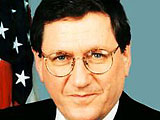An Inundation of Envoys
By Thomas Ruttig, Michael F Harsch for ISN
Earlier this month, Richard Holbrooke, US President Barack Obama's new envoy to Afghanistan and Pakistan, came to Kabul demanding that Afghan President Hamid Karzai take bolder actions on the widespread corruption in the country and improve government performance in delivering public services to its citizens. Holbrooke was, however, only the latest foreign envoy to deliver a growing list of demands from western capitals to Afghanistan's head of state.
Faced with an increasingly strong insurgency and a lack of progress in the economic development of the country, the West's latest answer has been the appointment of special envoys who are supposed to make national and international actions more coherent. Reportedly, Holbrooke has urged the European allies to nominate high-ranking diplomats as contact persons. British Foreign Secretary David Miliband and his German counterpart Frank-Walter Steinmeier have already responded to his request and have named Sherard Cowper-Coles and Bernd Mützelburg as special national envoys for Afghanistan and Pakistan.
It is a positive trend that a growing number of governments are recognizing the nexus between the developments in Afghanistan and Pakistan. However, there is a real danger that appointing even more chefs to oversee the kitchen will add to the confusion on the ground. The new envoys will not only have to coordinate with the UN Special Representative for Afghanistan Kai Eide of Norway. NATO has moreover appointed its own senior civilian representative who carries forward the alliance's "political-military objectives" in the country.
One would think that the EU, at the very least, might manage to coordinate its efforts. Instead, its Special Representative Ettore Francesco Sequi from Italy is likely to be further marginalized by the new national envoys.
On the military side, NATO is represented by the US General David D McKiernan who commands the International Security Assistance Force (ISAF). He is also the commander of the US-run antiterrorism and counterinsurgency program Operation Enduring Freedom (OEF) in Afghanistan, but in this function he does not report back to NATO Headquarters in Belgium, but to the US Central Command in Florida, led by General David H Petraeus.
With this plethora of international envoys and actors pursuing the distinct policies of their organizations and governments, Karzai certainly does not lack advice. On the contrary, he is getting a very good picture of exactly where his western allies disagree with each other. For example, there are longstanding frictions between the UK and other Europeans and the US on how to curtail the booming opium industry in the country. The Afghan government has been very good at playing their various western allies off against each other to distract from its own unwillingness to tackle the issue.
However, just because the major players have disagreements with one another about the right strategy, does not mean that they are doomed to eternal redundancy and lack of coordination. The trans-Atlantic community, despite all its differences, has a clear interest in presenting a united front, reducing duplication, the waste of resources and actors working at cross-purposes. There should be a willingness, at least, to share information about bilateral programs and projects.
The UN potentially possesses the authority and the legitimacy to become the primus inter pares that coordinates efforts in Afghanistan and helps to focus efforts on strategically important issues. UN member-states took some important steps to strengthen the UN presence in 2008. To play its coordinating role effectively, however, the UN will need the main donors' vigorous support, the mandate to coordinate other organizations, and the necessary staff on the ground.
In addition, a new small and overriding forum for day-to-day coordination should be created that involves only the major international and regional stakeholders, possibly based on a regional representation quota. That would guarantee that all donors have an input and are kept in the loop. The current high-level coordination mechanism, the Joint Coordination and Monitoring Board (JCMB), is a bureaucratic paper tiger, disconnected from the realities on the ground. The JCMB was originally envisioned as a "UN Security Council"; instead, it has turned into a "UN General Assembly" – a good place to hold speeches but much too big and cumbersome for any strategic planning and decision-making.
There is no quick fix for the daunting challenges Afghanistan faces today, and better coordination is not a panacea for all problems. It might, however, contribute to an urgently needed more unified approach of the international community to make the best out of the vast resources which the donor countries currently invest in Afghanistan`s stabilization and reconstruction. Without strong leadership on the ground and a well functioning coordinating forum, the new envoys might face a Sisyphean task.
